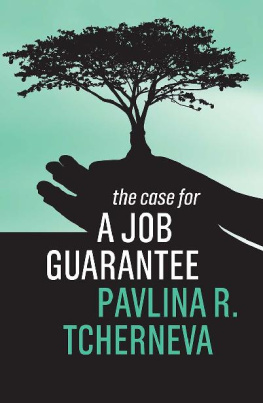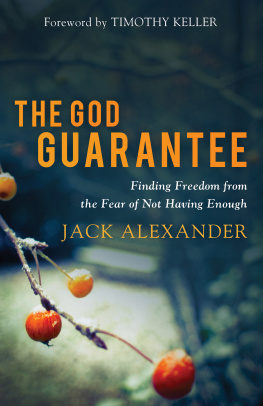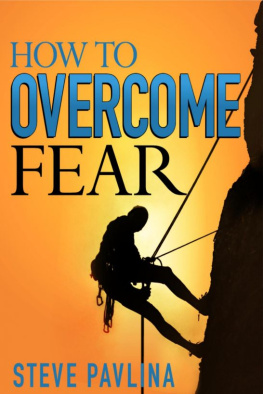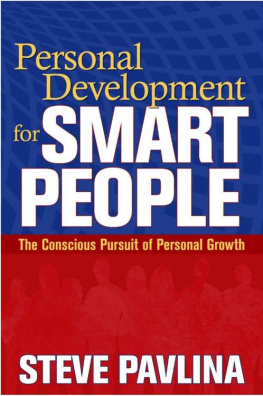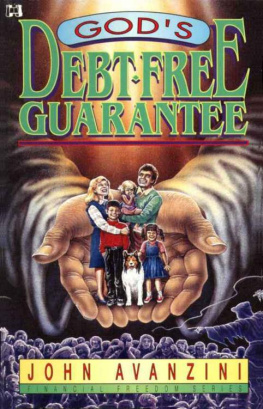CONTENTS
List of Tables
Chapter 1
Chapter 4
Chapter 6
List of Illustrations
Chapter 1
Chapter 2
Chapter 6
More than any other piece of public policy, the Job Guarantee can help us build a more equitable economy and just society. Pavlina Tcherneva has written the perfect primer for anyone interested in understanding why and how the Job Guarantee can do so much good.
Ady Barkan, activist, organizer and author of Eyes to the Wind
Many are coming to understand that the socioeconomic system in which we live or endure is broken, badly. There are solutions. The ideas in this valuable work point the way to a more civilized, indeed survivable, social order.
Noam Chomsky
The Job Guarantee is the next big, common-sense idea for economic reform. Over years of dedicated work, Pavlina Tcherneva has developed and advanced the plan, and today it stands poised to complement the Green New Deal and Medicare for All as a fundamental pillar of the progressive agenda. Read about it here and go out to help make it happen.
James K. Galbraith, The University of Texas at Austin
Tcherneva lays out the case for how we can raise the roof by lifting the floor, as we transition away from a failed and cruel economy based on an assumed percentage of unemployment. She demonstrates how a jobs guarantee can help address some of our biggest challenges, including bridging the gap to a Green New Deal and the critical conversion from a fossil-fuel economy to a sustainable future. Through her book we can see a world where everyone who wants to claim the dignity of work as their own has that right.
Sara Nelson, International President, Association of Flight Attendants-CWA, AFL-CIO
Pavlina Tcherneva offers an eloquent and convincing argument for a public sector job guarantee as an economic shock absorber. Particularly valuable is her demonstration of how such a program can revitalise local communities. Beyond this, her book is an indispensable primer for advocates of a Green New Deal.
Lord Robert Skidelsky, author of Keynes: The Return of the Master
Dedication
For my daughter Yvette
May you live in a world that is green and just.
The Case For series
Sam Pizzigati, The Case for a Maximum Wage
Louise Haagh,
The Case for Universal Basic Income
James K. Boyce, The Case for Carbon Dividends
Frances Coppola,
The Case for Peoples Quantitative Easing
Joe Guinan & Martin ONeill,
The Case for Community Wealth Building
Anna Coote & Andrew Percy,
The Case for Universal Basic Services
Gerald Friedman, The Case for Medicare for All
Andrew Cumbers, The Case for
Economic Democracy
Pavlina R. Tcherneva, The Case for a Job Guarantee
The Case for a Job Guarantee
Pavlina R. Tcherneva
polity
Copyright Pavlina R. Tcherneva 2020
The right of Pavlina R. Tcherneva to be identified as Author of this Work has been asserted in accordance with the UK Copyright, Designs and Patents Act 1988.
First published in 2020 by Polity Press
Polity Press
65 Bridge Street
Cambridge CB2 1UR, UK
Polity Press
101 Station Landing
Suite 300
Medford, MA 02155, USA
All rights reserved. Except for the quotation of short passages for the purpose of criticism and review, no part of this publication may be reproduced, stored in a retrieval system or transmitted, in any form or by any means, electronic, mechanical, photocopying, recording or otherwise, without the prior permission of the publisher.
ISBN-13: 978-1-5095-4211-6
A catalogue record for this book is available from the British Library.
The publisher has used its best endeavours to ensure that the URLs for external websites referred to in this book are correct and active at the time of going to press. However, the publisher has no responsibility for the websites and can make no guarantee that a site will remain live or that the content is or will remain appropriate.
Every effort has been made to trace all copyright holders, but if any have been overlooked the publisher will be pleased to include any necessary credits in any subsequent reprint or edition.
For further information on Polity, visit our website: politybooks.com
Acknowledgments
When I first began working on the Job Guarantee in the late 1990s, the consensus was that the US had reached full employment and the Goldilocks economy was here to stay. The argument made little sense but it convinced me that researching unemployment would be a solitary experience. Happily, I was wrong.
My journey began with the friendship and support of Mathew Forstater, Warren Mosler, and L. Randall Wray, and connected me to collaborators and friends, including William Mitchell, Stephanie Kelton, Fadhel Kaboub, Scott Fullwiler, among many others. The fellowship of the Job Guarantee grew. I met people from the US and abroad who enriched my work. They hailed from all corners of academia from history and law, to public policy and the humanities. I worked with policy makers who were designing and implementing similar programs. Environmental and social justice activists, youth organizations, journalists, and engaged citizens embraced the proposal. They have all contributed to where we are today, namely a place where the Job Guarantee is once again part of the national conversation and policy agenda.
While writing this book, I benefited greatly from conversations with Angela Glover Blackwell, Ral Carrillo, Grgor Chapelle, William Sandy Darity, Isabelle Ferreras, Trudy Goldberg, Rohan Gray, Darrick Hamilton, Philip Harvey, Sarah Treuhaft, and many others. My thanks to three anonymous referees and my editor George Owers, whose comments greatly improved this volume, and to my student Kirsten Ostbirk who helped with figures and references. Special thanks to John Henry for his generous feedback, often wrapped in some much needed humor. Needless to say, all opinions herein and any remaining errors are my own. Finally, my deepest gratitude goes to my family for their support, and especially to Douglas Johnson, who makes everything possible.
Preface
In the blink of an eye, millions lost their jobs. Like an inferno barreling across the globe, the coronavirus pandemic shutters one economy after another. Labor markets are cratering and the wave of layoffs has already turned into a tsunami. The Federal Reserve forecasts that US unemployment will surpass its 1930s Great Depression levels. And on the heels of this pandemic will come another the suffering and devastation that result from mass unemployment.
This book was written before the hemorrhage in the labor market began. Yet it enumerates the many ways in which unemployment behaves like a silent epidemic even while the economy is humming near full employment from the way it spreads, to its virulent nature, to the enormous social costs it inflicts on people, communities, and the economy. In just a few short months, these costs would be immeasurable.
The pandemic has exposed as farcical many of the conversations from yesterday. Raising the minimum wage to $15/hour, we were told, would cost jobs (as if workers in poverty were ever good for the economy). Today, its obvious that the people on whose labor we vitally depend are the very same people who cannot secure living wages and basic job protections. Store clerks, dispatchers, warehouse workers, delivery drivers, and sanitation staff are now lauded as essential workers, but when the economy recovers, will the experts once again call them low-productivity employees whose jobs are in need of automation?

